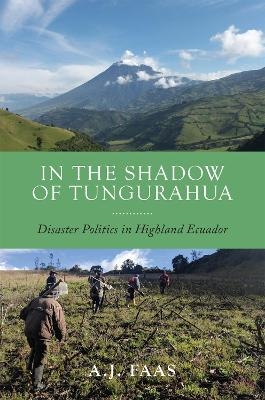
In the Shadow of Tungurahua
Disaster Politics in Highland Ecuador
Seiten
2022
Rutgers University Press (Verlag)
978-1-9788-3157-5 (ISBN)
Rutgers University Press (Verlag)
978-1-9788-3157-5 (ISBN)
Relates the stories of the people of Penipe, Ecuador living in and between several villages around the volcano Tungurahua and two resettlement communities built for people displaced by government operations following volcanic eruptions in 1999 and 2006.
In the Shadow of Tungurahua relates the stories of the people of Penipe, Ecuador living in and between several villages around the volcano Tungurahua and two resettlement communities built for people displaced by government operations following volcanic eruptions in 1999 and 2006. The stories take shape in ways that influence prevailing ideas about how disasters are produced and reproduced, in this case by shifting assemblages of the state first formed during Spanish colonialism attempting to settle (make “legible”) and govern Indigenous and campesino populations and places. The disasters unfolding around Tungurahua at the turn of the 21st century also provide lessons in the humanitarian politics of disaster—questions of deservingness, reproducing inequality, and the reproduction of bare life. But this is also a story of how people responded to confront hardships and craft new futures, about forms of cooperation to cope with and adapt to disaster, and the potential for locally derived disaster recovery projects and politics.
In the Shadow of Tungurahua relates the stories of the people of Penipe, Ecuador living in and between several villages around the volcano Tungurahua and two resettlement communities built for people displaced by government operations following volcanic eruptions in 1999 and 2006. The stories take shape in ways that influence prevailing ideas about how disasters are produced and reproduced, in this case by shifting assemblages of the state first formed during Spanish colonialism attempting to settle (make “legible”) and govern Indigenous and campesino populations and places. The disasters unfolding around Tungurahua at the turn of the 21st century also provide lessons in the humanitarian politics of disaster—questions of deservingness, reproducing inequality, and the reproduction of bare life. But this is also a story of how people responded to confront hardships and craft new futures, about forms of cooperation to cope with and adapt to disaster, and the potential for locally derived disaster recovery projects and politics.
A.J. FAAS is an associate professor of Anthropology at San José State University.
Preface
Prologue – Fire on The Mountain
Introduction – Reframing Disaster
Part I – Mobility and Legibility
Introduction
Chapter 1 – Mobilities & (Re)Settlements
Chapter 2 – Archipelagos and Bare Life
Chapter 3 – The Production of Space
Chapter 4 – The Four Walls of Bare Life
Part II – The Palimpsest of Minga
Introduction
Chapter 5 – Enduring Cooperation
Chapter 6 – Institutions
Chapter 7 – El Indigno, El Truco, El Chisme, Y El Adelanto
Part III – Recoveries
Introduction
Chapter 8 – “But We Did It”
Epilogue – Convivir
Acknowledgments
Notes
References
Index
| Erscheinungsdatum | 03.10.2022 |
|---|---|
| Zusatzinfo | 113 b&w illustrations |
| Verlagsort | New Brunswick NJ |
| Sprache | englisch |
| Maße | 156 x 235 mm |
| Gewicht | 463 g |
| Themenwelt | Sozialwissenschaften ► Ethnologie |
| Sozialwissenschaften ► Politik / Verwaltung ► Europäische / Internationale Politik | |
| Sozialwissenschaften ► Politik / Verwaltung ► Politische Theorie | |
| Sozialwissenschaften ► Soziologie ► Allgemeines / Lexika | |
| ISBN-10 | 1-9788-3157-9 / 1978831579 |
| ISBN-13 | 978-1-9788-3157-5 / 9781978831575 |
| Zustand | Neuware |
| Haben Sie eine Frage zum Produkt? |
Mehr entdecken
aus dem Bereich
aus dem Bereich
Studienbuch
Buch | Hardcover (2023)
De Gruyter Oldenbourg (Verlag)
44,95 €
erfolgreiche Interessenvertretung durch Prozesskompetenz im komplexen …
Buch | Hardcover (2023)
Wiley-VCH (Verlag)
42,00 €


